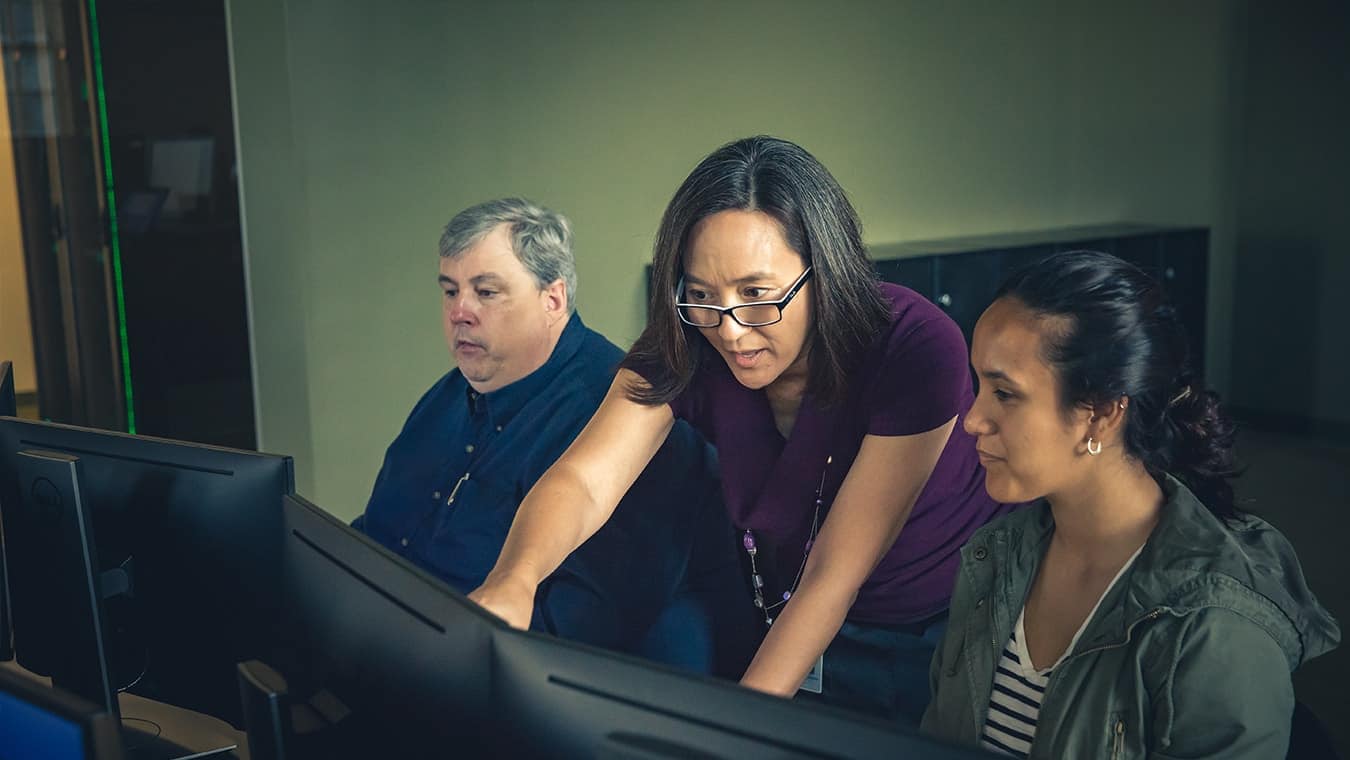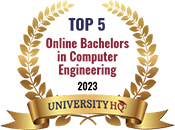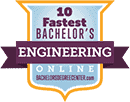
B.S. in Computer Engineering
Engineer Your Future
You love the challenge of problem-solving. Regent’s Bachelor of Science in Computer Engineering is a highly marketable degree that can prepare you to solve complex problems by applying principles of engineering, science, and mathematics. Study the fundamentals in systems thinking, software engineering, computer programming, and more—all taught from a Christian worldview.
DEVELOP YOUR SKILLS
Design IT solutions by understanding the relationship between computer hardware and software systems.
BUILD ON A STRONG FOUNDATION
Anchor your knowledge and skill on Christian principles and values.
LEARN FROM THE BEST
Be mentored by faculty in Virginia Beach who hold the highest degrees in their field.
ALIGN YOURSELF WITH EXCELLENCE
Regent has been ranked among the Top National Universities by the U.S. News & World Report (2025). Our programs have also ranked as the #1 Best Online Bachelor's Programs in Virginia 13 years in a row (2013-2025). We have also been recognized as a Military Friendly Top 5 School by Military Friendly®, 2024-25, and among the Top 10 Best for Vets Colleges: Online & Nontraditional by Military Times, 2020.
On completing the B.S. in Computer Engineering program, you can:
- Conduct experiments, analyze data, and interpret results
- Assess the impact of engineering solutions
- Design and engineer all aspects of modern computing systems
Career Opportunities:
- Software Developer
- Computer Hardware Engineer
- IT Systems Administrator
- Robotic Engineer
- Engineer Researcher
- Product Designer
| CSCI 201 | Introduction to Computer Science | 3 | Terms and concepts in Computer Science. Topics include a review of algorithms, elementary data structures, program design, and programming utilizing a block structured programming language. |
| CSCI 210 | Computer Architecture | 3 | Fundamental concepts and techniques in computational design and relevant mathematics, including logic circuit design, modern processor architecture, and assembly language. Preparation for professional certification exam. Prerequisite: CSCI 201. |
| CSCI 233 | Ethics for Computer Science | 3 | Issues relating to Computer Information Systems and the ethical and moral responsibilities of those who work with computers, professionals or end users. Provides foundation to make appropriate decisions when facing difficult situations. |
| CSCI 314 | Programming | 3 | Programming with the C++ language; object-oriented programming; classes, objects, inheritance, morphism; pointers, memory management; software development. Prerequisite: CSCI 201. |
| CSCI 315 | Data Structures & Algorithms | 3 | Studies the design of structures for representing and deploying information. Considers abstract structures and implementation techniques in specific programming languages. Prerequisite: CSCI 314. |
| CSCI 450 | Software Engineering | 3 | Fundamentals of Software Engineering, including understanding system requirements, effective methods of design, coding, team software development, and the application of engineering tools. Engineering methodology considers specifications, design, development, testing, production and maintenance. Prerequisite: CSCI 315. |
| ECEN 201 | Circuits | 3 | Introduces electrical engineering theory and its application to circuits. Fundamental concepts such as voltage, current, power, energy, Ohm’s Law, and circuit analysis techniques. |
| ECEN 310 | Microprocessors | 3 | Architecture, design and application of microprocessors. Programming of microprocessors and microprocessor-based systems in assembly and higher-level languages. Interrupt controllers and programmable I/O devices. Pre-requisites: CSCI 210 and ENGR 201. |
| ECEN 320 | Digital Systems Design | 3 | Digital circuitry, applying digital logic, describe and model digital systems using VHDL, fundamentals of digital computer hardware. Prerequisite: ECEN 220. |
| ECEN 340 | Signals & Systems | 3 | Theory and applications in signals, systems, and transforms. Mathematical background of signals and systems, including the Fourier transform, the Fourier series, and the Laplace transform. Pre-requisites: ENGR 202, MATH 220, and PHYS 222. |
| ECEN 410 | Embedded Systems | 3 | Design, analysis and testing of an embedded computer system. Tradeoff analysis and constraint satisfaction facilitated using appropriate engineering analysis techniques. Pre-requisite: ECEN 310. |
| ENGR 201 | Engineering Foundations I | 3 | History of engineering, standards & units, sensors & instruments, engineering drawing. |
| ENGR 202 | Engineering Foundations II | 3 | Engineering design and lifecycle, intelligent design, logistics & supply chains, engineering management. Introduction to traditional and contemporary branches of engineering. Prerequisite: ENGR 201. |
| ENGR 220 | Systems Thinking & Approach | 3 | Concepts, principles, and patterns of systems thinking. Systems dynamics, systems science. Systems approaches and graphical tools. |
| ENGR 240 | Engineering Economy | 3 | Principles, basic concepts and methodology of engineering economy. Time value relationship of money, cost estimation, risk identification, and analysis. Pre-requisite: ENGR 202. |
| ENGR 491 | Engineering Capstone I | 4 | Application of engineering concepts and principles to address a real-life problem. Prerequisite: Senior Standing and Department Approval. |
| ENGR 492 | Engineering Capstone II | 4 | Application of engineering concepts and principles to address a real-life problem. Prerequisite: ENGR 491. |
| ISYS 324 | Network & Telecommunication Concepts | 3 | Students gain in-depth knowledge of networking and telecommunications fundamentals including LANs, MANs, WANs, intranets, the Internet, and the WWW. Attention to data communication and telecommunication concepts, models, standards, and protocols in the context of installation, configuration, systems integration, and management of infrastructure technologies. Prerequisites: ISYS 204 and Sophomore standing. |
| MATH 211 | Calculus I | 4 | A first course in calculus and analytic geometry. Limits and continuity. Differentiation and applications of derivatives. Integration and the Fundamental Theorem of Calculus. Prerequisite: Grade of B- or better in MATH 164 or equivalent, or permission of department chair. |
| MATH 212 | Calculus II | 4 | A second course in calculus and analytic geometry. Techniques and applications of integration. Introduction to differential equations. Parametric equations and polar coordinates. Infinite series and power series. Prerequisite: Grade of C- or better in MATH 211. |
| MATH 213 | Calculus III | 4 | A third course in calculus and analytic geometry. Vectors, lines and planes. Three-dimensional space and calculus of several variables, including partial differentiation and multiple integrals. Introduction to vector analysis. Prerequisite: Grade of C- or better in MATH 212. |
| MATH 220 | Discrete Mathematics | 3 | Discrete structures including sets, relations, functions, matrices, graphs and trees. Symbolic logic, mathematical induction, and introduction to proofs. Probability, combinations, permutations. Introduction to linear programming. Prerequisite: MATH 102, MATH 164, or MATH 211. |
| MATH 230 | Linear Algebra | 3 | Systems of linear equations, linear transformations, and matrices, determinants, eigenvectors and eigenvalues. Euclidean spaces, vector spaces, and inner product spaces. Prerequisite: MATH 213. |
| MATH 301 | Probability & Statistics I | 3 | Discrete and continuous probability distributions, mathematical expectation. Introduction to statistical methods. Prerequisite: MATH 213 or concurrent enrollment. |
| MATH 320 | Differential Equations | 3 | First and second order differential equations with applications. Linear systems of differential equations. Laplace transforms. Introduction to stability, nonlinear systems, and numerical methods. Prerequisite: MATH 230. |
| PHYS 221 | University Physics I | 4 | Calculus based solutions in mechanics, heat, and sound. Applied Newtonian mechanics in single and multiple dimensions, cosmology and astronomical organization. Three credit hour lecture with one credit hour lab. Prerequisites: Grade of C or better in MATH 211. |
| PHYS 222 | University Physics II | 4 | Calculus based solutions in electricity, magnetism, and optics. Three credit hour lecture with one credit hour lab. Prerequisite: Grade of C or better in PHYS 221. |
Step 1: Apply to Regent University
Submit your application using the Regent University Online Application.
Note: If you are unable to complete our application due to a disability, please contact our Admissions Office at 757.352.4990 or admissions@regent.edu and an admissions representative will provide reasonable accommodations to assist you in completing the application.
Step 2: Submit Your Unofficial Transcripts
Submit your unofficial high school or college transcripts to regent.edu/items.
Upon submitting your application, you will receive an email requesting authorization for Regent University to obtain your official transcripts from your U.S. degree-granting institution. International transcripts must be evaluated by a NACES, AACRAO or NAFSA approved agency.
Step 3: Submit Your Government-Issued ID
To ensure academic integrity, Regent University requires a copy of a government-issued ID. Please submit a scanned copy or photograph of it to regent.edu/items.
Step 4: Submit Your FAFSA
Complete your Free Application for Federal Student Aid (FAFSA) at studentaid.gov Regent's school code is 030913.
Please feel free to contact the Office of Admissions at 757.352.4990 or admissions@regent.edu should you have any further questions about the application process.
Note: All items submitted as part of the application process become the property of Regent University and cannot be returned.
| Degree | Tuition Block Rate Per Semester | Credit Hours Per Semester | Tuition Rate Per Year |
|---|---|---|---|
| Students taking on-campus classes (fall & spring semesters) | $10,470 | 12 - 18 | $20,940 |
| Degree | Tuition Cost Per Credit Hour | Average Credit Hours Per Semester | Average Tuition Per Semester |
|---|---|---|---|
| Students taking on-campus classes (fall & spring semesters) | $698 | Under 12 | $8,376 |
| Students taking on-campus classes (fall & spring semesters) | $698 | Over 18 | $12,564 |
| Students taking on-campus classes (summer semester) | $698 | N/A | $2,094+ |
Student Fees Per Semester
| University Services Fee (On-Campus Students) | $900 (Fall & Spring) $750 (Summer) |
|---|---|
| University Services Fee (Online Students) | $750 |
| Degree | Tuition Cost Per Credit Hour | Average Credit Hours Per Semester | Average Tuition Per Semester |
|---|---|---|---|
| Part-Time Students (3-11 Credit Hours Per Semester) | $450 | 6 | $2,700 |
| Full-Time Students (12+ Credit Hours Per Semester) | $395 | 12 | $4,740 |
Student Fees Per Semester
| University Services Fee (On-Campus Students) | $900 (Fall & Spring) $750 (Summer) |
|---|---|
| University Services Fee (Online Students) | $750 |
| Degree | Tuition Block Rate Per Semester | Credit Hours Per Semester | Tuition Rate Per Year |
|---|---|---|---|
| Students taking on-campus classes (fall & spring semesters) | $9,975 | 12 - 18 | $19,950 |
| Degree | Tuition Cost Per Credit Hour | Average Credit Hours Per Semester | Average Tuition Per Semester |
|---|---|---|---|
| Students taking on-campus classes (fall & spring semesters) | $665 | Under 12 | $7,980 |
| Students taking on-campus classes (fall & spring semesters) | $665 | Over 18 | $11,970 |
| Students taking on-campus classes (summer semester) | $665 | N/A | $1,995+ |
Student Fees Per Semester
| University Services Fee (On-Campus Students) | $850 (Fall & Spring) $700 (Summer) |
|---|
Housing Fees » | Military Admissions & Aid » | Cost of Attendance »
| Degree | Tuition Cost Per Credit Hour | Average Credit Hours Per Semester | Average Tuition Per Semester |
|---|---|---|---|
| Part-Time Students (3-11 Credit Hours Per Semester) | $450 | 6 | $2,700 |
| Full-Time Students (12+ Credit Hours Per Semester) | $395 | 12 | $4,740 |
Student Fees Per Semester
| University Services Fee (Online Students) | $700 |
|---|
Program Educational Objectives
Within five years after graduation, many graduates of the Bachelor of Science in Computer Engineering at Regent University are expected to:
- Hold positions in computer engineering-related occupations and/or pursue advanced degrees.
- Provide leadership and service to their business, profession, or community consistent with a Christian worldview.
- Continue to update their technical knowledge and skills to remain current in their profession.
Student Outcomes
Graduates of the Regent University Bachelor of Science in the Computer Engineering degree program will be able to:
- Identify, formulate, and solve complex engineering problems by applying principles of engineering, science, and mathematics.
- Apply the engineering design process to produce solutions that meet specified needs with consideration for public health and safety, and global, cultural, social, environmental, economic, and other factors as appropriate to the discipline.
- Develop and conduct appropriate experimentation, analyze and interpret data, and use engineering judgment to draw conclusions.
- Communicate effectively with a range of audiences.
- Recognize ethical and professional responsibilities in engineering situations and make informed judgments, which must consider the impact of engineering solutions in global, economic, environmental, and societal contexts.
- Acquire and apply new knowledge as needed, using appropriate learning strategies.
- Function effectively on a team whose members together provide leadership, create a collaborative and inclusive environment, establish goals, plan tasks, and meet objectives.
- Recognize and apply relevant perspectives from a Biblical worldview to engineering situations.



